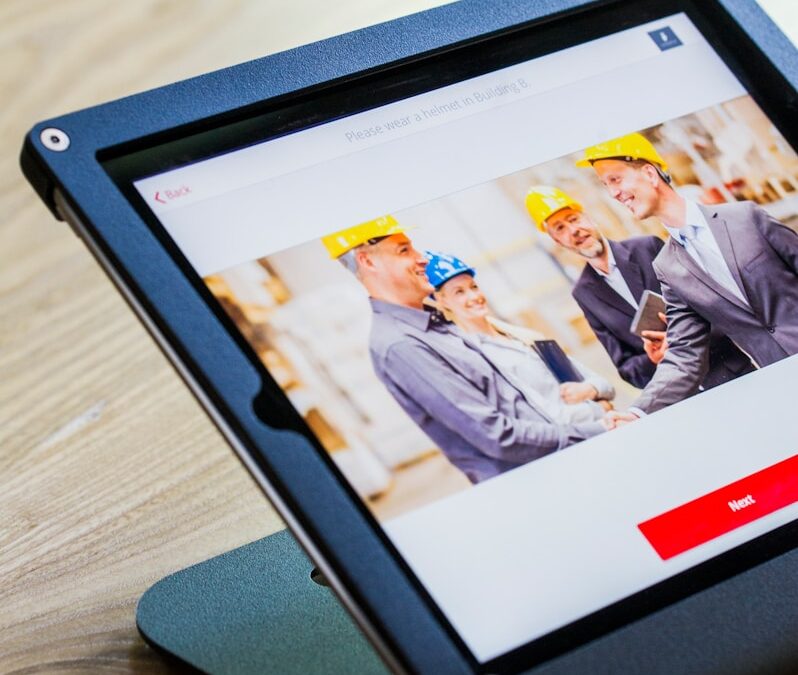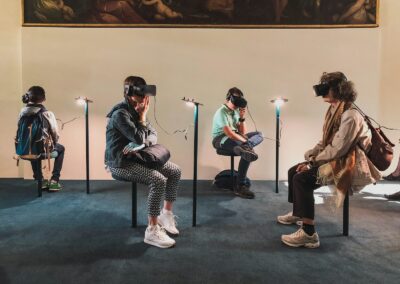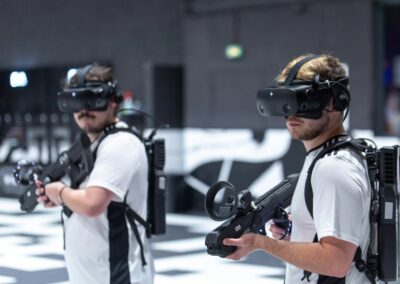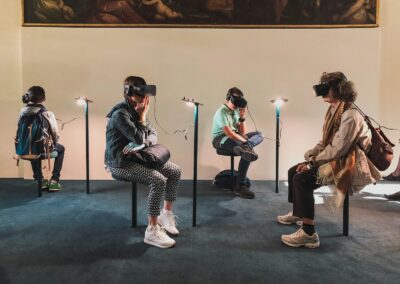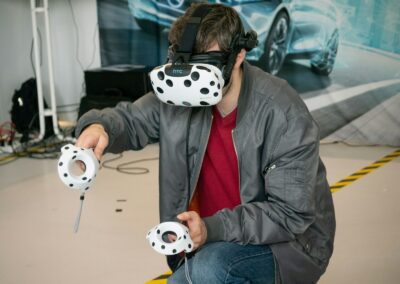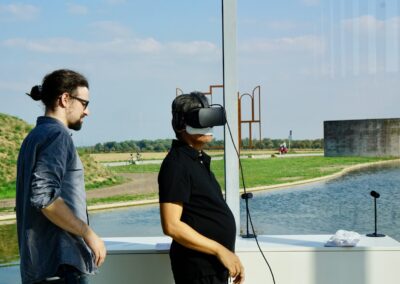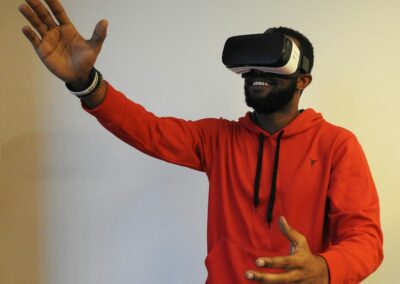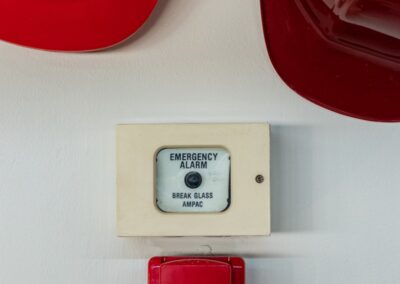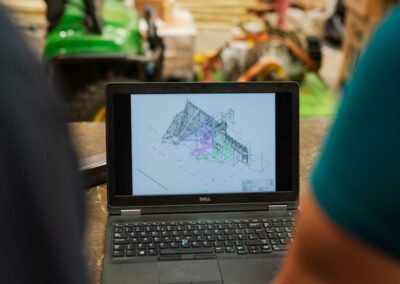Revolutionizing Safety Protocols Through Virtual Reality
The Impact of Virtual Reality Safety Training on Workplace Safety
Virtual reality safety training is transforming how companies approach workplace safety, providing employees with immersive and interactive experiences to identify and mitigate risks. In industries where safety is paramount, such as construction, manufacturing, and oil and gas, this innovative approach ensures that employees are better prepared to handle real-world hazards.
In regions like Saudi Arabia and the UAE, where infrastructure projects and industrial activities are booming, the implementation of virtual reality (VR) safety training is becoming increasingly vital. These programs offer a safe and controlled environment for employees to practice handling dangerous situations without the associated risks of physical harm. By simulating real-life scenarios, VR training helps employees develop the necessary skills and confidence to respond effectively in emergencies.
Moreover, VR safety training programs are designed to cater to various learning styles, making them more accessible and engaging for all employees. This personalized approach enhances knowledge retention and ensures that safety protocols are thoroughly understood and followed. As a result, companies in Riyadh and Dubai are witnessing significant improvements in workplace safety and compliance.
Benefits of Virtual Reality Safety Training
The adoption of virtual reality safety training brings numerous benefits to organizations aiming to enhance their safety protocols. One of the primary advantages is the ability to provide hands-on training in a risk-free environment. Employees can practice responding to hazardous situations, such as chemical spills, fires, and equipment malfunctions, without the fear of injury. This practical experience is invaluable in preparing employees for real-world challenges.
Additionally, VR safety training allows for standardized training across all levels of an organization. Traditional training methods often vary in quality and delivery, but VR ensures that every employee receives the same high-quality instruction. This consistency helps maintain a uniform standard of safety knowledge and practices, reducing the likelihood of accidents caused by human error.
In the UAE and Saudi Arabia, where large-scale projects often involve diverse and multilingual workforces, VR safety training can bridge communication gaps. The immersive nature of VR transcends language barriers, making it easier for employees to grasp complex safety procedures. This inclusivity ensures that all workers, regardless of their background, can benefit from effective safety training.
Improving Compliance and Reducing Costs
Implementing VR safety training programs also has a significant impact on regulatory compliance and cost reduction. By providing comprehensive and up-to-date training, companies can ensure that they meet industry safety standards and regulatory requirements. This proactive approach minimizes the risk of non-compliance penalties and legal liabilities.
Moreover, VR training can be more cost-effective in the long run compared to traditional training methods. While there is an initial investment in VR technology, the ability to reuse and update training modules without additional costs makes it a sustainable option. Companies in Riyadh and Dubai are finding that the savings from reduced accident rates and lower insurance premiums outweigh the initial setup expenses.
Another financial benefit is the reduction in downtime associated with traditional training. Employees can complete VR training modules at their own pace, without the need to halt production or operations. This flexibility ensures that training does not disrupt daily activities, leading to increased productivity and efficiency.
Future Prospects and Technological Integration
Integrating Artificial Intelligence and Blockchain in VR Safety Training
The future of virtual reality safety training lies in the integration of advanced technologies such as artificial intelligence (AI) and blockchain. AI can enhance VR training by providing real-time feedback and personalized learning experiences. For instance, AI algorithms can analyze an employee’s performance during training sessions and offer tailored recommendations for improvement.
Blockchain technology, on the other hand, ensures the integrity and security of training records. By creating an immutable digital ledger, blockchain can track and verify employee training histories, ensuring that all personnel have completed the necessary safety protocols. This transparency is particularly valuable in industries with stringent compliance requirements, such as oil and gas in the UAE and Saudi Arabia.
In Dubai and Riyadh, where technological innovation is a priority, the adoption of AI and blockchain in VR safety training is expected to set new standards for workplace safety. These technologies not only improve the effectiveness of training programs but also build trust among employees and stakeholders. By leveraging AI and blockchain, companies can provide a secure and personalized learning environment that meets the highest safety standards.
Preparing for the Metaverse: The Next Frontier in Safety Training
As the concept of the metaverse gains traction, virtual reality safety training is poised to evolve even further. The metaverse, a collective virtual shared space created by the convergence of virtually enhanced physical reality and physically persistent virtual reality, offers new opportunities for immersive learning. In the metaverse, employees can engage in collaborative training sessions, share experiences, and learn from each other in a highly interactive environment.
In regions like the UAE and Saudi Arabia, where digital transformation is rapidly advancing, the integration of the metaverse into safety training programs holds great promise. Companies can create virtual training centers that replicate their physical workplaces, allowing employees to practice safety procedures in a realistic yet virtual setting. This approach not only enhances the learning experience but also prepares employees for future work environments where virtual collaboration will be the norm.
Furthermore, the metaverse can facilitate continuous learning and development. Employees can access training modules, participate in simulations, and receive real-time feedback from anywhere in the world. This flexibility ensures that safety training is an ongoing process, keeping employees updated with the latest protocols and best practices.
The Role of Executive Coaching in VR Safety Training
Executive coaching services play a crucial role in the successful implementation of virtual reality safety training programs. By working with experienced coaches, companies can develop customized training strategies that align with their specific safety goals and objectives. Executive coaches can provide insights into the latest trends and best practices in VR training, helping organizations stay ahead of the curve.
In Saudi Arabia and the UAE, where leadership development is a key focus, executive coaching can enhance the effectiveness of VR safety training. Coaches can work with senior management to foster a culture of safety and continuous improvement. By emphasizing the importance of safety training at the executive level, companies can ensure that it becomes a core component of their organizational strategy.
Additionally, executive coaches can help identify potential challenges and barriers to the adoption of VR training. By addressing these issues proactively, companies can ensure a smooth transition to virtual safety training and maximize its benefits. This strategic approach is particularly important in regions like Riyadh and Dubai, where large-scale projects require meticulous planning and execution.
In conclusion, virtual reality safety training is revolutionizing workplace safety by providing immersive and interactive experiences that prepare employees for real-world hazards. By integrating advanced technologies such as AI and blockchain, and leveraging the potential of the metaverse, companies in Saudi Arabia, UAE, Riyadh, and Dubai can set new standards for safety training. With the support of executive coaching services, organizations can develop effective training strategies that enhance safety, compliance, and overall business success.
—
#VirtualRealitySafetyTraining #WorkplaceSafety #RiskMitigation #Compliance #SaudiArabia #UAE #Riyadh #Dubai #AI #Blockchain #Metaverse #ExecutiveCoaching #GenerativeAI #ModernTechnology #BusinessSuccess #LeadershipSkills #ProjectManagement

